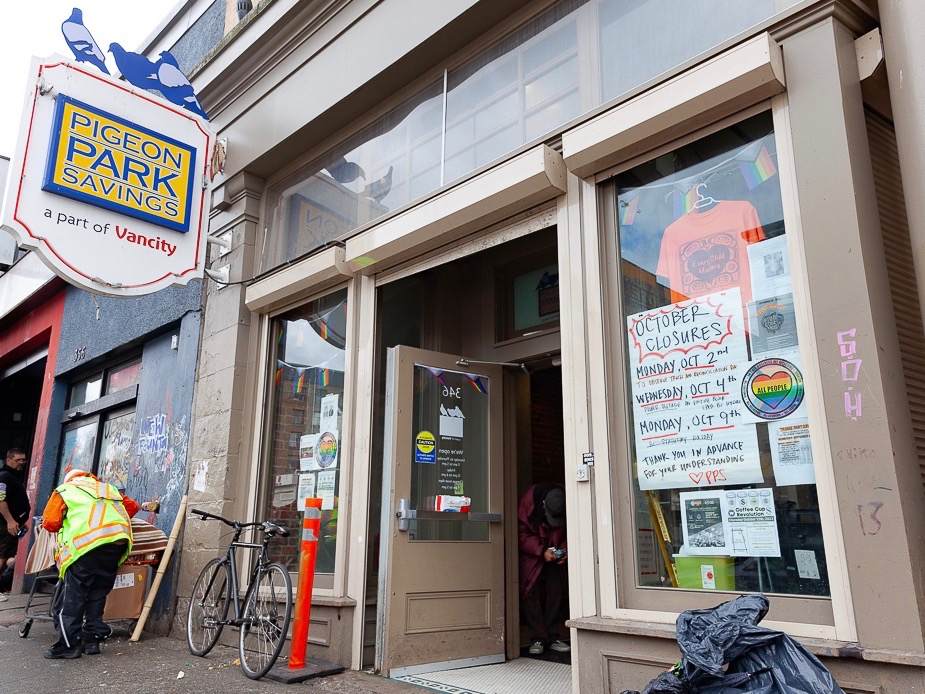It’s a fact that’s shown up in toxic drug death data for decades: deaths spike in the days following “Welfare Wednesday.” That’s the day in the middle of the month when people living in poverty get their cheque for an entire month’s worth of income assistance from the provincial government.
The BC Centre on Substance Use has estimated that between 2009 and 2013, 77 avoidable deaths could be attributed to the cheque policy. Both income assistance and disability benefits are distributed once per month, on the same day.
BC Coroners Service data shows that in 2018, deaths were 37 per cent higher in the days after people received their income assistance cheques. By 2022, the average number of deaths during cheque week were 44 per cent higher than in other weeks.
“There’s no reason it has to be done like this,” said Karen Ward, a Downtown Eastside resident and community advocate.
“This is simply cruelty by policy.”
Back in 2015, researchers set out to test whether a simple change could save lives. A total of 194 people took part in an experimental study for six weeks. They were put into one of three groups: one group had no change in their payment schedule; the second group got a lump sum at a different time in the month; and the third group got two payments two weeks apart, neither of which coincided with the usual welfare payment day.
The study focused on people living in the Downtown Eastside, the poorest neighbourhood in Vancouver.
The results were clear: people on the alternate payment schedules were less likely to increase their drug use on the days when they received their cheques.
“They were about half as likely to increase their drug use on individual payment days,” said Lindsey Richardson, an associate professor of sociology at the University of British Columbia who worked on the study.
There is also evidence that the mix of drugs becomes more unstable and dangerous around cheque day, as dealers prepare for increased demand. A study co-authored by Richardson that was published in 2022 found that during cheque day week, there may be more fentanyl and benzodiazepines circulating in the illicit drug supply, leading to more overdoses.
Fentanyl is a powerful synthetic opioid that has become the dominant opioid in the unregulated market, leading to a deadly overdose crisis throughout North America. Benzodiazepines are tranquillizers that have been increasingly mixed with illicit fentanyl and can complicate overdose recovery.
But Richardson said there were unintended consequences of taking some people out of the neighbourhood’s normal cycle of once-per-month payments. There was “an increase in people’s potential exposure to violence,” Richardson said.
Ward said that isn’t surprising: people who live in poverty and are addicted to illicit drugs are relying on a market system that uses intimidation and violence to ensure that people pay their debts.
Currently, that system is run by organized crime and revolves around the single payment per month, with debts collected on that day.
The BC Centre on Substance Use cheque day study concluded in 2019, although researchers are still studying certain aspects of the social experiment.
Richardson said there has been interest from the Ministry of Social Development and Poverty Reduction in the results, but she warned that there needs to be a careful assessment of possible consequences.
“There might be different solutions for different populations. So for people who use drugs, it might be that an individualized schedule is the best way forward,” Richardson said.
“But let’s say the province decided to switch and suddenly split everyone’s payments. Well, there are people who buy their food in bulk and can’t do that as effectively if their payments are split.
“Any policy change is going to have consequences for people’s financial management and it’s important to tend to that so that a policy change doesn’t inadvertently increase levels of unanticipated harm.”
Ward believes the deadly consequences of once-per-month income assistance payments are so clear that it no longer needs to be studied. She pointed out that being paid once per month is not common: people who are employed usually get paid every two weeks.
The low amount of both income assistance ($560 per month for a single person, plus a $500 housing allowance) and disability ($983 for single people, plus the housing allowance) means the single payment is even harder to manage. Saving is impossible, Ward said: “It’s binge and starve.”
Many people on assistance opt to have the shelter portion of their cheque go directly to their landlord, a payment method that can help people stay housed. Ward said that intervention is often helpful for people — but she wants to see people given more choice when it comes to how they’d like to receive their payments.
“It’s trapping people into this cycle, because you’re unable to make choices,” Ward said.
“They have the right to choose so they can get out of poverty.” ![]()
Read more: Health, Rights + Justice

















Tyee Commenting Guidelines
Comments that violate guidelines risk being deleted, and violations may result in a temporary or permanent user ban. Maintain the spirit of good conversation to stay in the discussion and be patient with moderators. Comments are reviewed regularly but not in real time.
Do:
Do not: